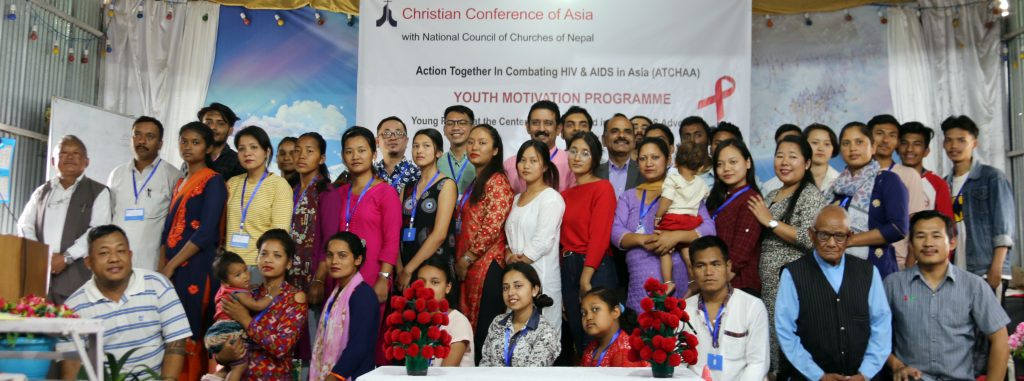Nepal's Christian Youths Commit to Combat HIV and AIDS
 Participants of the youth motivation training programme
Participants of the youth motivation training programme
Participants of a youth motivation training programme, focused on the theme 'Young People at the Center: Taking the lead in Combating HIV/AIDS and Advocacy', committed to be engaged in combating the menace of HIV and AIDS in Nepal.
The training organized by the Christian Conference of Asia (CCA) and hosted by the National Council of Churches in Nepal (NCCN) was held at the Emmanuel Church in Kathmandu from 21 to 23 June, 2019.
Thirty-five young Christian youths from different parts of Nepal attended the training.
The youth motivation programme aimed at engaging young people through interactive participatory processes. Creative group works, contextual interpretation of the Bible and analysis of real-life situations helped the young participants to think outside their comfort zones, and to create a safe space within the church and in the youth groups to become the channel of advocacy.
Taking into account the lack of awareness of the National AIDS programme in Nepal, the youths were made aware of the impact of the spread of HIV on the population. The information shared at various sessions enabled the participants to understand the role of the Church and the Christian youth in responding effectively to HIV and AIDS. The resource persons who led different workshop sessions highlighted the fact that ignorance and lack of awareness were the key factors that caused stigma and discrimination in the community; hence the young people were motivated to take a step further in building self-awareness, awareness within the Church and among the youths.
“The youths should take the message beyond the four walls of the Church and bring forth the healing touch of Jesus to those in pain and agony”, said Ps. Aiman Singh Gurung, President of the NCCN at the opening session.
Reflecting on the biblical narrative of the healing of the leper, Rev. Vinod Victor from the Church of South India emphasized the need for solidarity with people living in pain and agony. Christians have to follow the model of Jesus in compassion, and stretch out their hands and touch the marginalized.
Nirmala Gurung, a young Christian woman leader in Nepal who attended the training, expressed appreciation to CCA for addressing the very serious and important issue of HIV and AIDS which was not being talked about openly by the churches in Nepal, although the problem affected Nepalese society.
Ms. Gurung emphasized that due to the simplistic approach in addressing a topic which was not spoken within the church premises, the churches in Nepal were less aware of the gravity of the problem. In this context, she assured that the new initiative would motivate young people to undertake follow-up actions.
The action plans developed during the workshop will facilitate engagement with the youth to develop a proper strategy to involve more young people in advocacy and to reach the people in rural areas. The action plans also included the development of an advocacy strategy to demand services for testing, treatment, care and support for people living with HIV.
During the discussions, the youth affirmed that they would play a major role in advocacy among the wider communities to combat HIV and AIDS among the vulnerable population.
The workshop sessions were facilitated by Dr Ronald Lalthanmawia, Jay Roy Tipayan and Rev. Vinod Victor.
The youth motivation training held in Nepal is part of a series of programmes scheduled to engage Asian youths through CCA’s special programme 'Acting Together to Combat HIV and AIDS in Asia' ( ATCHAA).










